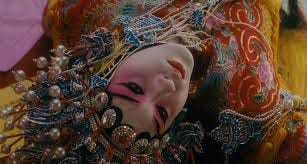Farewell My Concubine in China's History
Or how to gain clarity and feel compassion with history
Welcome to the fifth week of my World History Tour of China. This week we look at a major cultural artefact, Chen Kaige’s 1993 film Farewell My Concubine. This film offers clarity on China’s history and compassion for all its people. I also have a special message for you on gaining clarity and feeling compassion with history.
Through this film, we discover the history of China from the May Fourth Movement (1919) to the end of the Cultural Revolution (1976). We encounter classic Chinese literature, theatre and history that takes us all the way back to the Han dynasty. We experience the flux and fury of identities overtaken by history.
Farewell My Concubine
Farewell My Concubine (1993) is my favourite film of Chinese history, and not mine alone. Time magazine proclaimed it one of ‘100 Best Films in Global History’. It won the Cannes Palme d'Or at Cannes in 1993, and Golden Globe and BAFTA awards for Best Foreign Language Film. It is a masterpiece that overcame initial Chinese Government censorship, cutting 14 minutes from the first release. The entire film was restored and remastered in 2024.
Farewell My Concubine weaves together modern Chinese history, classical Chinese culture, profound images of identity confused by social turmoil, and the story of a love triangle. It centres on the relationships between two lifelong friends, Cheng Dieyi and Duan Xiaolou, who are performers in the Beijing opera, and Xiaolou's wife Juxian. Each central character moves in and out of personas on stage, in their triangular relationship, in China’s cultural revolutions, and in history.
On stage, the performers star in the classic of Chinese opera, Farewell My Concubine. In this opera, Cheng Dieyi plays Consort Yu, a woman. Duan Xiaolou plays the hero, Xiang Yu. Blurred gender, social, cultural, historical, and political identities are at the core of the film.
The opera is also known as The Hegemon-King Bids His Lady Farewell (Bà Wáng Bié Jī). It tells the story of Xiang Yu, the self-styled Hegemon-King (Ba Wang) of Western Chu, who battled for the unification of China with Liu Bang, the eventual founder of the Han dynasty (206 BCE to 220 CE). The Hegemon King (Ba Wang) farewelled his concubine on the verge of defeat by his rival. His armies were surrounded. Many of his soldiers deserted and joined the other side. As Linda Jaivin recounts in The Shortest History of China,
“At last, Liu Bang’s army, swollen with defectors from Chu, had Ba Wang surrounded. In what would become one of the most famous (if quasi-fictional) episodes in Chinese history, Liu Bang ordered the men of Chu in his army to sing loudly the songs of their homeland. The phrase ‘Chu songs on all sides’, meaning hopelessly besieged and isolated, entered the language.”
Jaivin, The Shortest History of China
When the opera Farewell My Concubine was first performed in 1918, after the collapse of the Qing dynasty, the start of the warlord period and amid the New Culture movement, many in China may have heard those ‘Chu songs on all sides’, and felt that sense of being hopelessly besieged and isolated. But theatre is not history, and so the creators of the opera focussed on the Liebestod story between the Hegemon King (Ba Wang or Xiang Yu) and his consort, Lady Wu.
With Ba Wang was his favourite horse and his beloved concubine, Lady Yu. Legend has it that when he set his horse free, it refused to run off, and Lady Yu killed herself with Ba Wang’s sword rather than desert him - a story told, among other places, in the opera at the centre of Chen Kaige’s 1993 Palme d’Or-winning film, Farewell My Concubine.
Jaivin, The Shortest History of China
Bejing Opera is performed again in China today, but for decades after 1949 it was suppressed as part of the old China. The suppression was most intense during the Cultural Revolution, and this traumatic experience transforms the love triangle of Cheng Dieyi, Duan Xiaolou, and Xiaolou's wife Juxian.
In the Cultural Revolution bands of students came together in militias to harass all forms of culture, other than party propaganda. They burned down the house, as we might say today, and denounced all things old. They tortured, humiliated, and publicly shamed teachers, professors, bureaucrats, theatre performers, or anyone who wanted to lead an orderly or a nonconformist life. They rectified their ideas on their knees, with auto-da-fe caps on their heads and placards with slogans hung around their necks.
In one scene of the film, a young Red Guard denounces his actor parent for his ideological mistakes. It is a stunning dramatization of how sometimes in history cruelty overwhelms compassion. The scene is even more compelling when you learn that the director, Chen Kaige, is recreating a scene from his own life. During the Cultural Revolution, Chen joined the Red Guards and denounced his own father, who himself was a theatre director. Later in 1969, Chen himself would be forced into agricultural labour and the army. Only at the end of the cultural revolution in 1975 did he reclaim his life, first as a factory worker, and then from the 1980s a film director. Farewell My Concubine is not a distorted Western view of China’s modern history. It is an authentic account of a Chinese insider and an insightful outsider.
Modern China’s cultural transformations, especially the furies of the Cultural Revolution, prepare the viewer for the climax of Farewell My Concubine. During the Cultural Revolution, Cheng Dieyi is denounced, betrayed, and humiliated. Farewell My Concubine is forced off stage. Maoist agitprop takes its place. The old costumes and scripts are destroyed. The confusion of identity, gender and love suppressed. Only at the end of the film, after the Cultural Revolution had burned out, does Cheng Dieyi resume with dignity her or his or their role as the consort, Lady Yu.
If the film is new to you, I will not spoil the ending. But now, at least, like any cultured Chinese viewer of the film, you know how the Liebestod story of Lady Yu and Ba Wang goes.
You can watch Chen Kaige’s film via the Internet Archive here. A restored, remastered version was released in 2024. There are clips and a trailer of the remastered film on YouTube.
You can also watch a 2014 performance of the Beijing Opera version of the theatrical classic, Farewell My Concubine here or on streaming services.
Over the next week, please take some time out from books and bad news to watch Farewell My Concubine in some form. This cinematic masterpiece will give you clarity on modern China’s history. It will inspire compassion for how we can both endure and inflict cruel traumas on each other.
Gain clarity and compassion with history
I mentioned in this week’s deep-dive that I am doing a mid-year review of my content on Substack and YouTube. Why? I want the Burning Archive to serve your search for the wisdom to live in tune with a changing world.
In this time of global realignment of powers and cultures, competing narratives stir confusion and fuel grievance. Those narratives twist and tangle history into distorted tropes. They do not read history mindfully. They do not see the past enduring in the present. They do not look upon the many cultures and possibilities of this world with compassion.
In writing the Burning Archive I offer a different approach to reading history to make sense of the world today. I call it mindful history.
I aim first to gain some clarity on the world as it is, and some compassion for how people all over the world want it to be. Every week I let go of illusions and seek a glimpse of an authentic story from history.
Then I share any insights from my inquiries with you. In this confusing, polarising changing world, these glimpses might help you gain clarity and feel compassion with history. My hope is that the burning archive opens a path of peace and dialogue, not war and strife.
Those insights for paid subscribers currently include Real History Guide to the Post-1945 World, my Imagine you are a Foreign Minister guide to geopolitics and history, my Nobel Archive, and my weekly deep dives (with their full real voiceovers). I also learn from my paid subscribers through comments and live calls. I am refining what I offer to all readers so that my writing is not too much, not too little, but just right.
So please upgrade to a paid subscription. We can learn from history together. We can be mindful in these troubled times. We can walk together the path of peace and dialogue, guided by a little bit of imaginative, cultured world history.
P.S. Coming Up on The Burning Archive
Coming up next Saturday, I will recommend a Chinese historian’s account of the Cultural Revolution.
On Monday, in the Slow Read of The Books of Jacob, we will pick up the pace and reflect on chapters 13 to 15 of “The Book of the Road,” and look at a Princess of Poland and a sex scandal that provoked many historic events in The Books of Jacob.
On Wednesday, in the deep dive, we will explore Klaus Mühlhahn’s assessment of the first twenty years of the Socialist Transformation of China from 1949 to the early 1960s, on the eve of the Cultural Revolution.
Coming up on YouTube next week, I have two great interviews.
The first interview, coming out on Monday, will be with KJ Noh on the international child adoption scandal in Korea. We will also discuss winner of the Nobel Prize in Literature in 2024, Han Kang, and her writing on the historical traumas of partitioned Korea.
The second interview, coming on Wednesday, will be with Pascal Lottaz and Warwick Powell, on how the world is responding to American missteps in the Age of Geopolitical Churn, as Indian External Affairs Minister, Dr S. Jaishankar called it.
Look out for my Notes during the week for any news and some shares of the best in history and literature.
Thanks for reading
🙏❤️🌏
Jeff





Thank you Jeff for your unstinting labour (of love, I think). Your mindful history is a rich and enriching anchor for my questing mind. A great gift🙏❤️
Thanks Jeff! Great angle.
What happened between 1984 and 1994 in Chinese cinema is, I think, truly unique. I can’t think of any other movement where art house meets historical epic meets political therapy. And they worked with a clear purpose. Imagine WWII veterans having ten years to make films about the war before censorship closes the topic for good!
Anyway, Farewell my Concubine is obviously a great choice. However, I'd urge any fans to also watch Blue Kite and To Live. All three were released basically in tandem, just when the cencors were dropping the veil on these topics in post-Tiananmen China. Farewell passed the cencors—just about. To Live and Blue Kite did not. This is a tragedy because they were much closer to the everyday experience of the average Chinese. (Indeed, I picked To Live as the go-to film for someone trying to understand 20th Century China. https://onhumans.substack.com/p/how-to-understand-chinese-history)
Anyway, thanks for writing this Jeff! No better way to dig into Chinese history.
PS. For anyone interested, both Blue Kite and To Live are on YouTube with English subs! Blue Kite is a bit low quality but I didn’t mind.